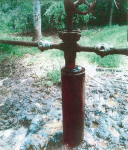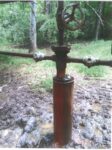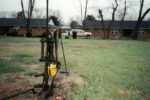- Like
- Digg
- Del
- Tumblr
- VKontakte
- Buffer
- Love This
- Odnoklassniki
- Meneame
- Blogger
- Amazon
- Yahoo Mail
- Gmail
- AOL
- Newsvine
- HackerNews
- Evernote
- MySpace
- Mail.ru
- Viadeo
- Line
- Comments
- Yummly
- SMS
- Viber
- Telegram
- Subscribe
- Skype
- Facebook Messenger
- Kakao
- LiveJournal
- Yammer
- Edgar
- Fintel
- Mix
- Instapaper
- Copy Link
State “general permit” for disposal of drilling pit waste
A driller is not allowed to just knock a wall out of the pit and let the water and other stuff in it run into a stream, either during or after drilling. And if the water they are spraying runs across the surface into a stream, that is also illegal. If you see any of those things happening, take pictures, make notes and contact the state Office of Oil and Gas in Charleston, and make a complaint!
However, after they are done with the drilling, the laws allow them to treat what fluids are left in the pit to certain standards, and then “land apply” it. “Land apply” means to spray it onto the land so that it soaks in and does not run into a stream. (If you own your minerals and they have not yet been leased, you can negotiate to prohibit this in the lease.)
The legal permission from the State that the driller has to do this comes from a “General Water Pollution Control Permit” for pit waste discharge issued by the State. The “general” permit has the treatment standards and other requirements. If you want to see the general requirements they must follow, read General Water Pollution Control Permit for pit waste discharge. To be covered by the “general” permit for a particular well, the driller has to register the well site with the State. The site registration application includes information showing where they intend to do the spraying at that particular well site, etc.
The driller has to have a permit from the State to drill an oil or gas well. (For more information on the permit process etc. see the “West Virginia Surface Owners Guide to Oil and Gas”.) The driller registers a particular well to be covered by the “general” permit for pit waste discharge at the same time that the driller applies to the State for its permit to drill a particular oil or gas well. The permit application includes a “Site Registration Application Form, General Permit for Oil and Gas Drilling Pit Waste Discharge”. This is usually part of the State “Form WW-9″. The full title of the State form is “CONSTRUCTION AND RECLAMATION PLAN AND SITE REGISTRATION APPLICATION FORM GENERAL PERMIT FOR OIL AND GAS PIT WASTE DISCHARGE”. (This form also includes the plan for road and pit construction and reclamation etc.)
Before they spray the water they are supposed to treat the water, primarily by “liming” it. Here is an excerpt that give more information on this liming process from the Sooty Paws web site. Thanks to Sooty Paws for allowing us to use this.
So, if you want to see generally what the driller can do, see General Water Pollution Control Permit for pit waste discharge. If the driller has already applied for a permit, you can see the specific plans for a particular well by looking at a copy of the permit application.
If you are the surface owner, they should have served you with a copy of the permit application with the site registration application included. You will have 15 days to comment.
If you are a neighbor you can get a copy of the permit from the Office of Oil and Gas. Before you call, get what information you can about the well – the number of the well, the name of the operators etc. If you can find an “API” number on the well, that is like its social security number (and looks a little like one) and will make things easiest.
If the driller has not applied for a permit yet, you can learn a lot from the general permit, but you will just have to ask the driller where they intend to spray. We have heard a couple complaints where this caused vegetation to die, and if that happens they are doing it wrong. Again, contact the state Office of Oil and Gas in Charleston. And let us know too so we can keep track of these things! We do not know if there are long term impacts.
Is this “fairly necessary”?
What if you are a surface owner and do not want the driller to spray this water onto your land, or bury their pit liner with its waste material on your land?
If you own surface and minerals, and if you have not yet signed a lease, then you can negotiate into any lease you sign that the driller has to truck out the water and pit liner etc. Some companies will agree to do this. Some will not. If it is important to you, find a lessee that will do this with whom to sign a lease.
If you own the surface and minerals and have already signed a lease, you are in a difficult position. Read the lease very carefully to see if there is language in it you can use to say that they cannot do this. Much more likely you will find language that says either that they specifically can do this or language that gives them broad discretion to do what is “necessary and convenient” to drill for gas. They will say this is convenient. Such language may put you in a worse situation than a surface only owners, but read on.
If you own only the surface and not the minerals, then the courts have ruled that the driller can do whatever is “fairly necessary” to drill for their oil or gas. There is no specific court case on whether doing this spraying of water and burying of the pit liner is more than is fairly necessary or not. It is up to the arguments you could make to the judge. You can count on the driller to say that, “Hey, the State tells us this is OK to do, how can it be so damaging to the surface owner that it is more than is fairly necessary?” The State’s permit is some evidence that you will have to overcome, but it is possible. Your position might be stronger if you can make a case that is specific to your particular property. Something like the location of the burying of the pit liner being a good home site etc. that will now be sterilized. So this is a difficult case, but there are some lawyers who might take this case.




